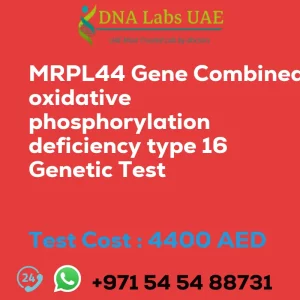VKORC1 Gene Coumarin Resistance Genetic Test
Test Components
- Price: 4400.0 AED
- Sample Condition: Blood or Extracted DNA or One drop Blood on FTA Card
- Report Delivery: 3 to 4 Weeks
- Method: NGS Technology
- Test Type: Metabolic Disorders
- Doctor: General Physician
- Test Department: Genetics
Pre Test Information
Clinical History of Patient who is going for VKORC1 Gene Coumarin Resistance NGS Genetic DNA Test
A Genetic Counselling session to draw a pedigree chart of family members affected with Coumarin resistance
Test Details
The VKORC1 gene is responsible for producing a protein called vitamin K epoxide reductase complex subunit 1, which is involved in the metabolism of vitamin K. This gene is particularly important in the response to anticoagulant medications, such as warfarin. Coumarin is a type of anticoagulant medication that acts by inhibiting vitamin K epoxide reductase, thereby reducing blood clotting. However, some individuals may have genetic variations in the VKORC1 gene that result in reduced sensitivity to coumarin-based medications. These individuals require higher doses of the medication to achieve the desired anticoagulant effect.
NGS (Next-Generation Sequencing) is a high-throughput DNA sequencing technology that can be used to analyze multiple genes simultaneously. In the context of coumarin resistance, NGS can be used to identify genetic variations in the VKORC1 gene that may contribute to reduced sensitivity to coumarin-based medications. The NGS genetic test for coumarin resistance typically involves obtaining a DNA sample, usually through a blood or saliva sample, and sequencing the VKORC1 gene to identify any genetic variations.
The results of the test can help healthcare providers determine the appropriate dosage of coumarin-based medications for individuals with coumarin resistance. It’s important to note that genetic testing for coumarin resistance is not typically performed as a routine test but may be considered in certain cases, such as when an individual requires high doses of coumarin-based medications or experiences unusual responses to these medications. The test results can help guide treatment decisions and optimize the therapeutic effect of anticoagulant medications.
| Test Name | VKORC1 Gene Coumarin resistance Genetic Test |
|---|---|
| Components | |
| Price | 4400.0 AED |
| Sample Condition | Blood or Extracted DNA or One drop Blood on FTA Card |
| Report Delivery | 3 to 4 Weeks |
| Method | NGS Technology |
| Test type | Metabolic Disorders |
| Doctor | General Physician |
| Test Department: | Genetics |
| Pre Test Information | Clinical History of Patient who is going for VKORC1 Gene Coumarin resistance NGS Genetic DNA Test A Genetic Counselling session to draw a pedigree chart of family members affected with Coumarin resistance |
| Test Details |
The VKORC1 gene is responsible for producing a protein called vitamin K epoxide reductase complex subunit 1, which is involved in the metabolism of vitamin K. This gene is particularly important in the response to anticoagulant medications, such as warfarin. Coumarin is a type of anticoagulant medication that acts by inhibiting vitamin K epoxide reductase, thereby reducing blood clotting. However, some individuals may have genetic variations in the VKORC1 gene that result in reduced sensitivity to coumarin-based medications. These individuals require higher doses of the medication to achieve the desired anticoagulant effect. NGS (Next-Generation Sequencing) is a high-throughput DNA sequencing technology that can be used to analyze multiple genes simultaneously. In the context of coumarin resistance, NGS can be used to identify genetic variations in the VKORC1 gene that may contribute to reduced sensitivity to coumarin-based medications. The NGS genetic test for coumarin resistance typically involves obtaining a DNA sample, usually through a blood or saliva sample, and sequencing the VKORC1 gene to identify any genetic variations. The results of the test can help healthcare providers determine the appropriate dosage of coumarin-based medications for individuals with coumarin resistance. It’s important to note that genetic testing for coumarin resistance is not typically performed as a routine test but may be considered in certain cases, such as when an individual requires high doses of coumarin-based medications or experiences unusual responses to these medications. The test results can help guide treatment decisions and optimize the therapeutic effect of anticoagulant medications. |








